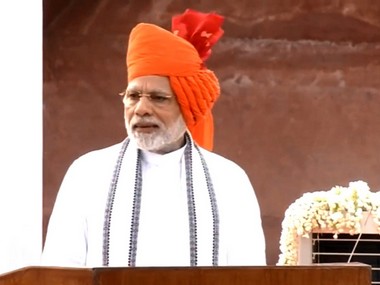Did direct benefit transfer (DBT) really save the exchequer a colossal Rs 90,000 crore, and was this entirely due to elimination of 6 crore ghost beneficiaries, as Prime Minister Narendra Modi said in his Independence Day speech? Going by data on the website of the DBT Mission, 8.8 crore duplicate, fake/non-existent and ineligible beneficiaries have been weeded out from various schemes, much more than the 6 crore Modi referred to (in the case of MNREGS, only the savings in wages on account of this is mentioned, not the number of beneficiaries). The 6 crore figure could be for the PAHAL scheme and the public distribution system (6.54 crore dubious beneficiaries have been deleted under these two schemes).
There is a caveat in the case of PDS and the National Social Assistance Programme (NSAP) – some names might have been deleted on account of migration and death). It is, however, unlikely that these instances will be significant enough to alter the numbers hugely.
But what about the financial savings figures? The three biggest contributors to savings are the PAHAL scheme (Rs 42,275 crore), PDS (Rs 29,708 crore) and the MNREGS (Rs 16,703 crore). Now in the case of PAHAL, the role of the decline in global oil prices between 2015 and early 2018 needs to be factored in. So the savings could not have come entirely through the elimination of fakes/ghosts/duplicates (the data given by the DBT Mission does factor in 2.22 crore consumers giving up the cooking gas subsidy voluntarily). Unfortunately, with no clarity on how much savings came from the elimination of beneficiaries and how much from falling oil prices, both the government and its critics can make claims and counter-claims without challenge. The deletion of 2.75 crore ration cards is a significant achievement, but even here it is not clear how much of the RS 29,708 crore savings came from the cash transfer programmes in the Union Territories of Chandigarh, Puducherry and Dadra and Nagar Haveli. Also, how much is because of genuine beneficiaries not being able to take their monthly rations for various reasons (failure of biometric authentication being a significant one)? [caption id=“attachment_4969571” align=“alignleft” width=“380”]  PM Modi addressing the nation on Independence Day from Red Fort. Pic courtesy: Twitter@NarendraModi[/caption] Nitpicking over, it’s time to stress that the amount of savings is not the main point. The main point is a fundamental shift in the manner of delivering welfare through less leaky pipes. It is possible that the poor are still not getting the entire rupee meant for them, but the amount being lost will be significantly less than the 85 paise the late Rajiv Gandhi lamented about. And that is no mean achievement; Modi has reason to boast. But it is now time for his government (and whoever comes to power in 2019) to build on this. One essential step is to look beyond macro numbers and get state/local governments to look into individual cases to ensure that genuine beneficiaries have not been eliminated for whatever reason, mainly due to lack of Aadhaar/ration card. While Aadhaar’s usefulness in de-duplication cannot be denied, it is also a pain point on the ground. It was meant as a proof of identity but is being used by individual departments as an eligibility document; the lack of it has often been used an excuse to deny someone a ration/below poverty line card. Besides, there are many instances of authentication failure due to various factors. These may not be statistically significant but even one eligible beneficiary being denied what is due is one too many. This problem is particularly acute in the case of PDS where biometric authentication is needed each time a beneficiary goes to the ration shop. Economists Ashok Kotwal and Bharat Ramaswami had suggested a way out of this problem – a one-time authentication at longer intervals – and it is time some government looked at this proposal seriously. The PDS is a state subject, so perhaps some state government can take the lead in this.
What DBT/Aadhaar does not eliminate is quantity fraud – where a ration shop owner gives a beneficiary less than what he is entitled to. This is known to happen even in urban centres like Delhi.
Right-to-food activists want to do away with DBT/Aadhaar because of this but that will not be the right response. States will have to tone up their governance systems to deal with this. It is quite possible that the government may actually end up showing fewer savings; it may even end up spending a mite more. But that is a small price to pay in the battle against vested interests who want to retain a leaky system. The political and economic gains of ensuring that the needy get the welfare benefits due to them will be far more. (The writer is a senior journalist and author. She tweets at @soorpanakha)


)
)
)
)
)
)
)
)
)



